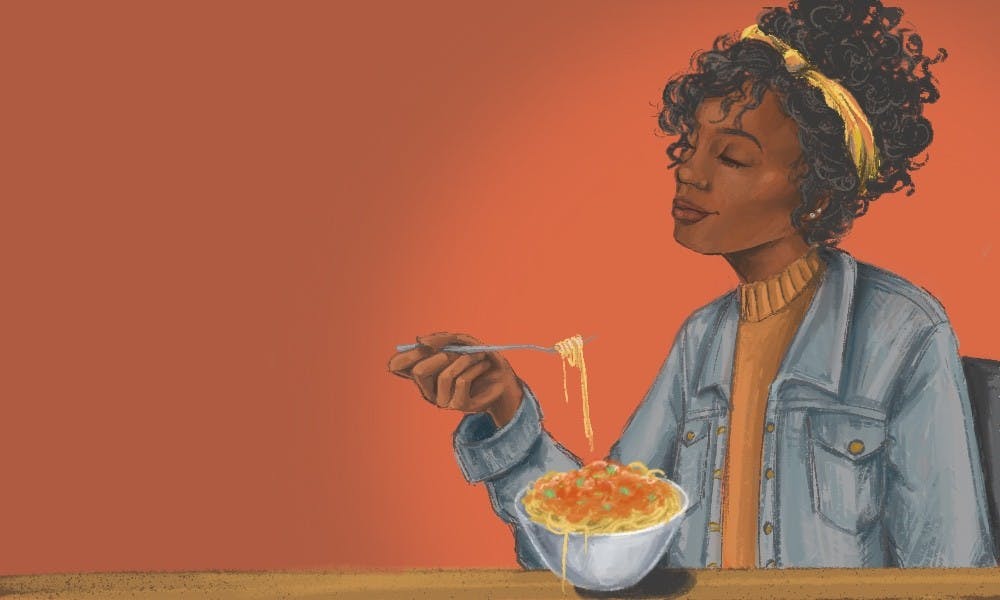My family rarely ate dinner together growing up. What can I say? We were busy people, and certainly still are. Both of my parents worked nine–to–five jobs, but often had to arrive earlier or stay later for important meetings. So by the time they drove across town to pick my sisters and me up from our after–school programs or soccer practices, and then drove another twenty minutes to get home, we were all so hungry we often didn’t care what was for dinner.
That all changed, of course, as we got older, became more independent, and learned how to drive. With a little more time on their hands, my parents made more frequent attempts at cooking, and began to provide us with some truly amazing dinners. My dad in particular, a self–proclaimed francophile, would spend Saturdays toiling over Julia Child cookbooks, crafting cassoulets in the winter, and roasting ratatouille in the summer. We were still busy, and often one of us would be missing from the table at one point or another, but we started eating dinner together on the weekends.
I came to college after a summer blessed with these dinners that focused on the details of humble flower arrangements, matching tableware, and the perfect light setting. It’s no wonder I developed an infatuation with Ina Garten—my high school household prioritized the same details she did in a meal.
This romance did not transfer to Penn’s dining halls, where the food is perpetually bland, the light coldly fluorescent, and the company not always amiable. For social reasons, I feared eating alone, thinking people would see me for exactly what I was: a diffident girl with few friends. So when I couldn’t find a way to retreat to my dorm room for a meal, or was too hungry to skip it altogether, I armed myself with a book or my laptop as distraction from outside judgment. I fell into that old habit from my childhood of not really caring what I ate. The lack of any actual comfort in the dining halls’ “comfort food” sections left my stomach feeling empty no matter how much I consumed.
What followed my re–adoption of those old patterns is another rather dark story, but somehow I turned my eating habits around. After moving into a house with a gorgeously open kitchen my sophomore year, I grew more confident in cooking my own meals, and I began to feel a satisfaction in eating something that I had taken the time to care for and create, even if the flavors weren’t always perfect. I still ate many meals alone, but in the comfort of my own home, away from the eyes of strangers, I began to put down the books and close my laptop to give my food the attention it deserved.
The concept of eating alone is seen as being really good or really bad, depending on who you ask. For as many studies and articles as there are about positive psychological and esteem-boosting effects of the practice, there are an equal amount of ones decrying it as inducing early patterns of heart disease and depression. Truthfully, there are both healthy and unhealthy aspects of eating alone. Because food and dining can be rather fraught subject matter for a lot of people, making a definitive statement on whether eating meals alone is objectively good or bad for everyone is beyond impossible.
But just like an obscure new ingredient or recipe, I believe anything is worth trying once. For me, eating alone is no longer something I fear, but an event to which I look forward. Between work and classes and trying to figure out what to do next year, I relish even a half hour to myself for dinner, when I can mute my phone, and slowly chew my food as I retrace the day in my head.
My love of eating alone grew with a long–developing comfortability in being on my own. I didn’t realize how much I enjoy my own company until I started spending more time with myself. I cherish an extra garnish of fresh rosemary, savor the smell of sesame oil, and honor a Friday evening glass of Pinot Noir, because these small enhancements to a meal alone interrupt the dreary monotonies of life and imbue them with a modest magic, the kind I’ve slowly realized I want and deserve.
I continue to dine Lucullus cum Luculo because my solitary time at the dining table with a good meal and some even better music is my chance to check in with myself, to take the quiet breaks that I know I need as an introvert. Setting the table and opening a new bottle of San Pellegrino water doesn’t make me feel like the slightly mad woman from Hitchcock’s Rear Window, but like Carrie Bradshaw sipping a glass of red wine at a sidewalk café—an iconic fall style look, by the way.
This is not to say that there aren’t days when meals last five minutes, or that I don’t still feel anxious about dining alone in public every now and then. Not every meal is as romantic as I’d like for it to be, but when I see a moment of time that I can have all to myself, I take it. Because in a way, preparing a meal just for me is not only an act of appreciation for the art of cooking and eating, but a practice in self–endorsement. As a psychologist quoted in an article from 1985 said, the ritual of preparing a festive meal for oneself allows one to say, “look what I did for myself—I must be worthwhile.” Now that I know that I am, eating alone doesn’t feel so scary.

